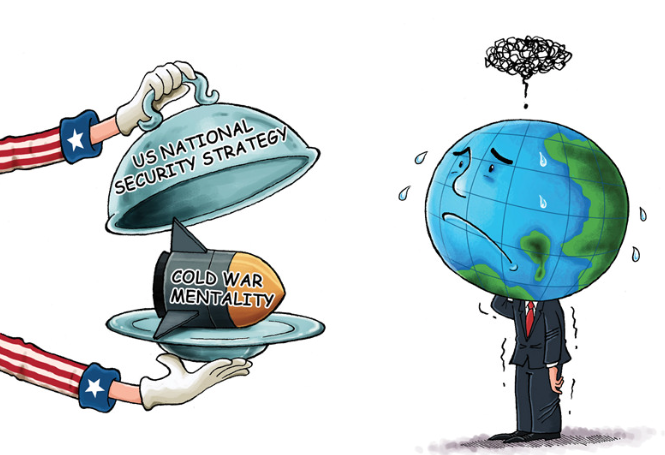Exposed: The perils of United States hegemony

That the U.S. is a hegemony is today an accepted fact. In almost all spheres of life, the superpower has for decades exerted pervasive influence from political, military and economic to technology and cultural. Similarly, U.S. critics accuse the superpower of throwing its weight around, wanton use of force, looting and Exploitation, monopoly and suppression and, spreading false narratives
The scenario was recently laid out explicitly in a report titled, “US Hegemony and Its Perils” published in February, 2023 China presents the relevant facts and seeks to draw greater international attention to the perils of U.S. practices to world peace and stability. The report says that since becoming the world’s most powerful country, the U.S. has acted more boldly to interfere in the internal affairs of other countries, pursue, maintain and abuse hegemony, advance subversion and infiltration, and willfully wage wars, bringing harm to the international community.
The report accuses the U.S. of exercising double standards on international rules. Placing its self-interest first, it has walked away from international treaties and organisations and put its domestic law above international law. In April 2017, the Trump administration announced that it would cut off all U.S. funding to the United Nations Population Fund.
The country quit UNESCO twice in 1984 and 2017. In 2017, it announced leaving the Paris Agreement on climate change. In 2018, it announced its exit from the UN Human Rights Council. In 2019, the U.S. announced its withdrawal from the Intermediate-Range Nuclear Forces Treaty to seek the unfettered development of advanced weapons. In 2020, it announced pulling out of the Treaty on Open Skies.
Militarily, says the report, the history of the U.S. is characterised by violence and expansion. Since it gained independence in 1776, the superpower has constantly sought expansion by force – slaughtered Indians, invaded Canada, waged a war against Mexico, instigated the American-Spanish War, and annexed Hawaii.
In recent years, the U.S. average annual military budget has exceeded $700 billion, accounting for 40 percent of the world’s total, more than the 15 countries behind it combined. The U.S. has about 800 overseas military bases, with 173,000 troops deployed in 159 countries.
Economically, after World War II, the U.S. led efforts to set up the Bretton Woods System, the International Monetary Fund and the World Bank, which, together with the Marshall Plan, formed the international monetary system centered around the U.S. dollar. By taking advantage of the dollar’s status as the major international reserve currency, the economic giant is basically collecting “seigniorage” (the difference between the value of currency/money and the cost of producing it) from around the world; and using its control over international organisations, it coerces other countries into serving America’s political and economic strategy.
The U.S. exploits the world’s wealth with the help of “seigniorage” (the difference between the value of currency/money and the cost of producing it). It costs only about 17 cents to produce a $100 bill, but other countries had to pony up $100 worth of actual goods in order to obtain one. It was pointed out more than half a century ago that the U.S. enjoyed exorbitant privilege and deficit without tears created by its dollar and used the worthless paper note to plunder the resources and factories of other nations. America’s economic and financial hegemony has become a geopolitical weapon.
Fourth, the U.S. seeks to deter other countries’ scientific, technological and economic development by wielding monopoly power, suppression measures and technology restrictions in high-tech fields. The country monopolises intellectual property in the name of protection. Taking advantage of the weak position of other countries, especially developing ones, on intellectual property rights and the institutional vacancy in relevant fields, the U.S. reaps excessive profits through monopoly.
The U.S. has fabricated a slew of excuses to clamp down on China’s high-tech enterprises with global competitiveness and has put more than 1,000 Chinese enterprises on sanction lists. In addition, the United States has also imposed controls on biotechnology, artificial intelligence and other high-end technologies, reinforced export restrictions, tightened investment screening, suppressed Chinese social media apps such as TikTok and WeChat, and lobbied the Netherlands and Japan to restrict exports of chips and related equipment or technology to China.
Fifth, the global expansion of American culture is an important part of its external strategy. The U.S. has often used cultural tools to strengthen and maintain its hegemony. American values and lifestyle are tied to its movies, TV shows, publications, media content and programmes by government-funded non-profit cultural institutions. It thus shapes a cultural and public opinion space in which American culture reigns and maintains cultural hegemony.
U.S.-dominated Western media has a particularly important role in shaping global public opinion in favor of U.S. meddling in the internal affairs of other countries. The U.S. government strictly censors all social media companies and demands their obedience. Twitter CEO Elon Musk admitted on December 27, 2022, that all social media platforms work with the U.S. government to censor content, reported Fox Business Network. Public opinion in the country is subject to government intervention to restrict all unfavourable remarks. Google often makes pages disappear.
The report laments that these hegemonic, domineering and bullying practices of using strength to intimidate the weak, taking from others by force and subterfuge, and playing zero-sum games are exerting grave harm. The historical trends of peace, development, cooperation and mutual benefit are unstoppable.











